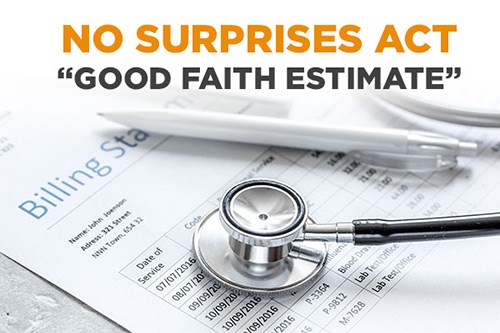Updated FAQs for the No Surprises Act - Good Faith Estimates
Client AlertThe No Surprises Act (“NSA”) became effective January 1, 2022. Meant to protect consumers from surprise medical bills, the new law is good for consumers, but vexatious for health care providers and facilities. One particular source of frustration is the operationalization of the Good Faith Estimate (“GFE”) requirement, governed by Part II of the regulations that implement the NSA. The GFE requirements apply broadly to all healthcare providers and facilities that practice within the scope of their state-issued license.

Much of the information in the newest set of FAQs reinforces what we already know about the GFE requirements, but HHS does provide some important updates. If you are a health care provider or facility and you provide services to uninsured or self-pay patients, these are the highlights you need to know:Part II of the NSA requires health care providers and facilities to provide to uninsured and self-pay patients a good faith estimate of the cost of any reasonably expected items or services. The U. S. Department of Health and Human Services (“HHS”) released in December 2021 its first set of FAQs regarding the GFE requirements. With a few months of implementation under its belt, HHS released on April 5, 2022, a second set of GFE-related FAQs.
- A GFE does not have to include a diagnosis code if one does not apply. If a provider or facility is unable to provide a diagnosis code at the time of scheduling (e.g., the patient is a new patient with no available history), then a GFE does not have to include a diagnosis code. However, the provider or facility must still include the expected charges and service codes for the items and services to be furnished during that visit, even when no diagnosis code is available. Also remember that when the provider is able to add a diagnosis code, they are required to do so for future GFEs.
- The GFE is considered part of a patient’s medical record and must be maintained in the same manner as the patient’s medical record.
- A GFE must only include items or services reasonably expected to be furnished in conjunction with the primary item or service. Providers do not have to include charges beyond those that are reasonably expected to be scheduled with the primary item or service.
- For recurring items or services, a GFE must include in a clear and understandable manner the expected scope of the recurring items or services (e.g., timeframes, frequency, and total number of recurring items or services). If the provider identifies any new items or services between the date of scheduling and the date of the appointment, the provider must issue to the uninsured (or self-pay) individual a new GFE no later than one business day before the items or services are scheduled to be furnished.
- The requirement to provide a GFE is not triggered upon scheduling if an item or service is being scheduled fewer than three business days before the date the item or service is expected to be furnished.
- If the patient loses their insurance coverage or decides to become self-pay between the date of scheduling and the date of the appointment, and if the patient informs the practice/provider at least three business days prior to the appointment date, then the GFE requirements will apply to that patient. If the patient does not tell the practice/provider about their new uninsured/self-pay status until the day of the appointment (or anytime less than three business days before the appointment), then the GFE requirements do not apply.
More information on the NSA can be found in previously released client alerts regarding Part I and Part II as well as the recent litigation concerning the NSA. CMS has also developed a website for providers and patients to use for NSA information and dispute resolution.
If you have any questions about the No Surprises Act and how it applies to your practice, or would like help developing GFE templates for your practice, please contact BMD Healthcare and Hospital Law Members Ashley Watson (abwatson@bmdllc.com) or Daphne Kackloudis (dlkackloudis@bmdllc.com).
This article does not constitute legal advice.